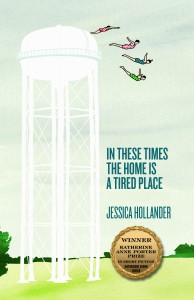Book Review
In her debut story collection In These Times the Home is a Tired Place, Jessica Hollander plays with form in interesting ways. The stories run the spectrum: flash fiction pieces to longer scene-driven narratives, stories told in second person or second person plural, some molded into one continual paragraph, or the title story, a fractured narrative told in modules that make up three lists. The range of work gives the collection a texture of the unexpected. While many themes recur, their treatments often feel playfully new.
Many stories in the collection, which won the 2013 Katherine Anne Porter Prize in Short Fiction, focus on female protagonists transitioning into adulthood. Many are post-college narratives with couples in their early 20s navigating relationships, feigning real lives. Of course, these navigations give rise to tensions—for example, in the form of the adult boyfriend in “Like Falling Down and Laughing” who regresses to teenage-hood. His regression includes an inability to handle the professional world and a penchant for chopping up the couple’s living room furniture. “You can’t lock in a thing like adulthood,” says the girlfriend, watching him take a knife to their couch’s upholstered arm shortly before he moves back into his childhood home. While the girlfriend finds other ways to move forward in this story, which first appeared in The Cincinnati Review, her boyfriend clearly removes himself, or more accurately hides, from the trajectory.
Often Hollander’s characters question the life trajectory that has been imprinted on them since childhood; many stories focus on young people unsure of or skeptical of the next step. For example, the female narrator of “This Kind of Happiness” tells us: “Then it was spring. There was a path called Standard Expectations, and this path was paved and kept clean, and every week a maintenance crew came and groomed the grass and trimmed the big shaded trees making passage as easy as possible. Here is the path, the path said. Don’t you want me? … Then it was spring, and the boyfriend wanted to get married.” This and many other narratives underscore the collection’s title—the home here is indeed a tired place. “My home’s an altered universe,” says the college-age protagonist of “January on the Ground,” “My parents are strange sad versions of themselves.” If home is indeed the end point for many of these trajectories, do these characters want to embark on them at all?
Hollander’s stories often explore the intricacies of sibling dynamics as well as the relationship between a mother and her adult children. She examines the familiar dichotomy that evolves between an irresponsible child and a sibling who is only slightly more responsible. Pregnancy features strongly as well: an interrogation of motherhood, of who may be suited for it, who may have missed her chance or ruined her family. Mothers who feel inadequate are common. These themes come together in “You Are a Good Girl I Love You,” in which a mother laments her older daughter’s growing distance from the family, telling the other, more stable daughter: “I should be more a mother. There was so much fathering I figured it wasn’t necessary.” Or take the mom in the heartbreaking “What Had Become of What She Had Made,” who questions her parental abilities in a sad loop and wonders whether her life has any worth if both daughters’ lives are scattered and unhappy.
Despite its dissatisfactions with home and descriptions of the uncertainties and disappointments of navigating adulthood, the collection also carries a line of humor and playfulness. One of my favorite lines, for example, is: “They let him run around like a wild boar tearing up lettuce.” Or “I Now Pronounce You,” a later story that takes an interesting meta-fiction turn when describing the falling-apart marriage of a former waitress and her all-American man: “The wife wants to know why she has to be the wife… The cop and the author want to know how a Hooters waitress married to a traditional sports-loving American flag knows and cares so much about the problems with gender roles and how they’re perpetuated.” Such moments, demonstrating Hollander’s willingness to push the form and even inject humor while retaining a sometimes tragic, often tender undertone, give In These Times the Home is a Tired Place a necessary depth that allows the stories to resonate beyond the page.
About the Reviewer
Corey Campbell’s fiction has appeared in The Gettysburg Review, Colorado Review, The Rattling Wall, Necessary Fiction,Gulf Stream, Conte, Anderbo, and The Coachella Review, among other publications. A graduate of Warren Wilson’s MFA Program for Writers and a contributing editor of the journal Waxwing, Ms. Campbell lives in Phoenix, AZ, where she’s completing her first collection of short stories.
